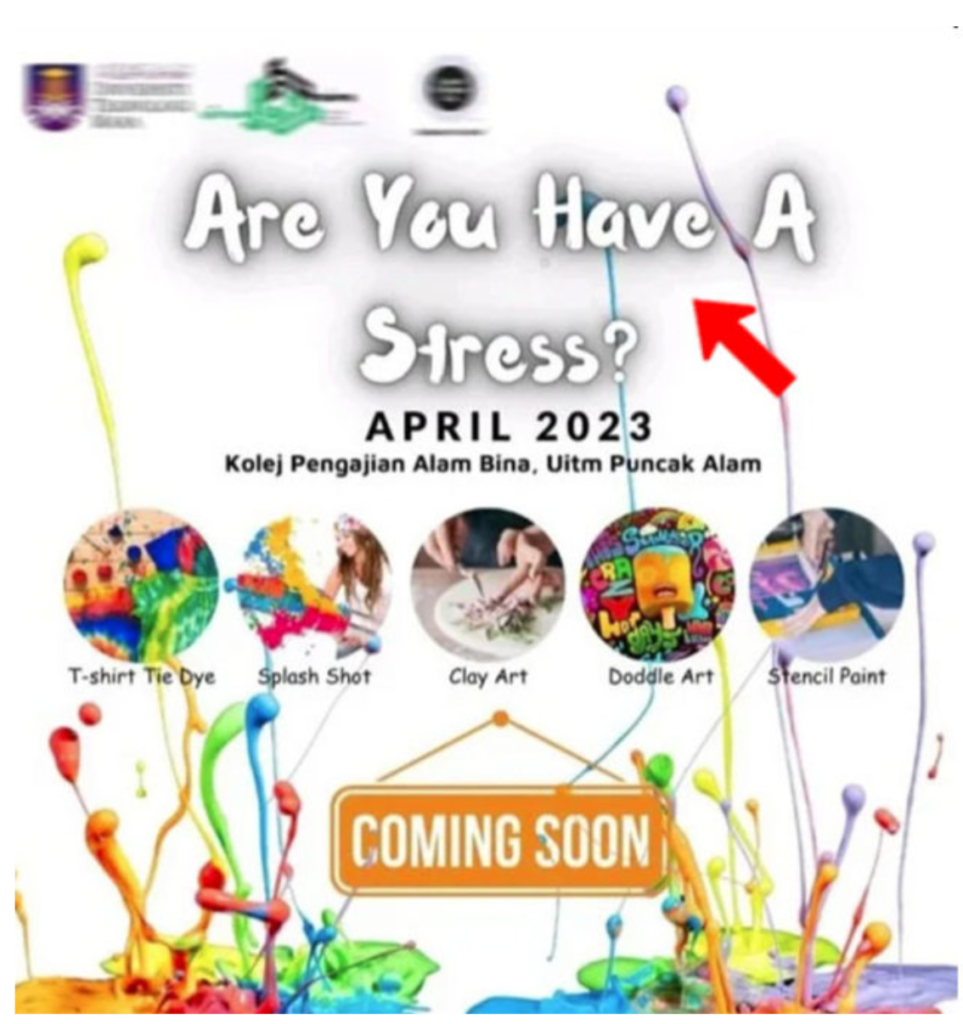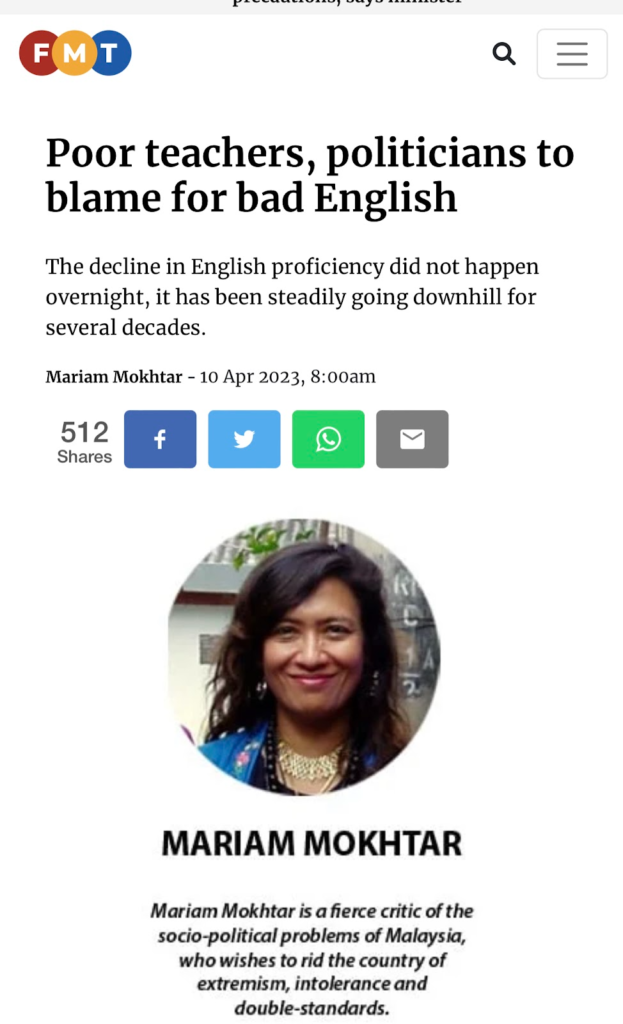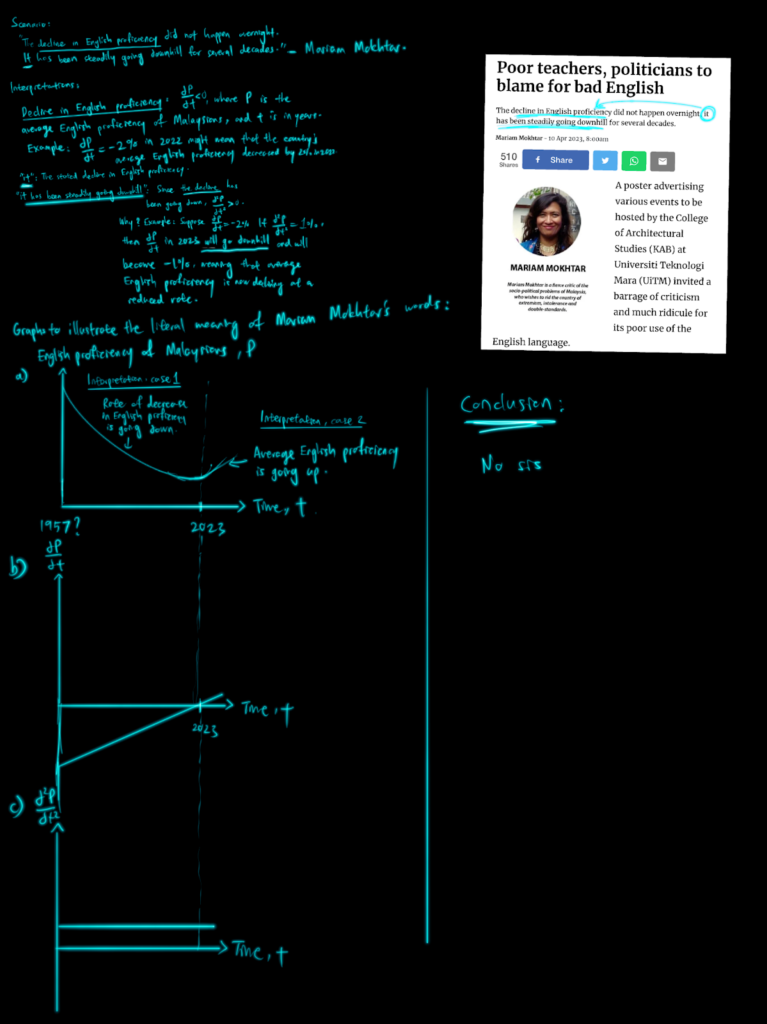One of the questions that parents most commonly ask is whether their child should take IGCSE First Language English (0500) or if they should take English as a Second Language (0510).
The question seems simple, but its implications are deep; that’s why in this post, I’ve decided to write a little bit about the pros and cons of First Language English (FLE) versus English as a Second Language (ESL).
I’ll provide that list of pros and cons for both curricula below. Meanwhile, as you read the comments that I will provide, please also consult the updated (2024-2026) Cambridge syllabi for First Language English (FLE)…
Link: https://www.cambridgeinternational.org/Images/635230-2024-2026-syllabus.pdf
…And for English as a Second Language (ESL) below.
Link: https://www.cambridgeinternational.org/Images/637363-2024-2026-syllabus.pdf
With that said…
Let’s begin!
Let’s first talk about the pros and cons of First Language English (FLE).
Pros of First Language English 0500:
1. Higher complexity and greater prospect of development.
First Language English requires students to learn how to read with the purpose of creating inferences and also with the purpose of synthesising information on a much higher level than what is required for English as a Second Language.
The tasks that a student needs to successfully accomplish are significantly more complicated and require skills that are the consequence of higher order linguistic development, which are not something that the English as a Second Language curriculum meaningfully develops or requires of candidates who are taking on this curriculum.
First Language English requires longer summaries (~120 words), requires students to read longer texts, requires students to consider language as a metaphenomenon (and to comment on writer’s effect with respect to word choice), and to write descriptive and narrative pieces that require more advanced writing skills (the word count you must write in First Language English is much longer, and there is a dedicated writing paper) and therefore imagination, reasoning, and various other skills that require students to develop themselves extensively throughout the entire period in which the curriculum is to be administered in order for them to do well.
As a result of these more advanced requirements, in the event that the student is taught well, they will learn much more than a student who merely takes on English as a Second Language.
2. More advanced classmates.
In the event that your child takes on FLE, they are going to meet classmates that have the intention of taking the hardest possible curriculum, and will have a network of peers who are more capable of speaking the English language on average.
As iron sharpens iron, so too can having more advanced classmates help a student learn how to master the English language to a larger degree; these classmates will help your child to become a much better speaker than they may have become if they had simply taken on ESL instead.
3. Greater expectations of self.
In the event that your child takes First Language English, they will likely have higher expectations of themselves and the sense that they need to aspire for more and to develop themselves more along the course of their journey.
I have seen numerous students come and go, and it is the students who expect more of themselves who end up going much further distance in the long run; I think that First Language English is valuable for providing that sense of expectation to a greater degree than what a student would experience if they had taken on English as a Second Language instead.
Cons of First Language English 0500:
1. Requirement for more advanced instruction in order to excel.
Because First Language English is more complex, it requires students to have a stronger background, to work harder, or to have an excellent teacher if neither of these things apply if they want to excel in the exam.
A reliance upon teacher certification or experience alone is not advisable, for the simple reason that no specific first language English certification exists, and the majority of teachers that you will encounter on the market either only have CELTA or Teaching of English as a Second Language (TESL) as certifications, neither of which serve as perfect teaching qualifications for this curriculum.
Moreover, from having interviewed dozens of English teachers, some with CELTA or TESL qualifications and even some with Head of Departmentships at prominent international schools and dozens of years of experience, I have discovered that not all of them are capable of demonstrating the skills that they claim that they are trying to develop in their students, which raises a question in my mind as to whether work experience at an international school is meaningful as a way of differentiating educators by their teaching ability or not.
2. Requirement for more base preparation and motivation.
First Language English success requires students to have more base preparation and motivation to learn in order to succeed and to do well within the course.
How well a student can do in FLE often depends on how much prior preparation and interest they have had in the English language, past schooling experiences, or from the culture of the families that they came from, and this often results in students who have enjoyed reading and speaking in English throughout their lives having an advantage in this curriculum.
This is natural, since this is after all a First Language curriculum and is meant to challenge even students who primarily speak English at home.
On the other hand, if a student hasn’t had exposure to advanced English language material or communication in their lives before, whether because they weren’t exposed to it in school or there wasn’t a culture of speaking or writing in English either within their peer groups or their families, they face an uphill battle to acquire these skills in a relatively short time frame and to do well.
This is a primary concern for students whose schools do not offer them the choice to take English as a Second Language at all and force them to take First Language English instead, but potentially something that you can avoid if your school offers you a choice and you (parent) genuinely think that your child cannot cope, or you (student) are too intimidated by this curriculum…
Which you shouldn’t be, in my opinion.
Still, those are the cons of First Language English…
Now let’s talk about English as a second language.
Pros of English as a Second Language 0510:
1. More likely that instructors will be qualified and capable because the exam is easy.
Although a good teacher is desirable in every situation, the requirement to find an instructor that is skilled and capable is not as pressing for IGCSE ESL students as much as it is for FLE students.
Many teachers across the world (not just Malaysia) have Teaching of English as a Second Language (TESL) qualifications, and because the 0510 curriculum is relatively simple in content, it’s not difficult to find instructors who are capable of delivering the standard of instruction that you will need; such an instructor merely needs to deliver the basics of English language mastery and simply has to encourage their students to develop attention to detail; the skills required to deliver the curriculum are not extensive.
Therefore, if you aren’t able to seek out a teacher who is good or you aren’t willing to gamble in order to seek out an educator with skills to catalyze your child’s linguistic development, ESL may be a better choice.
2. Easier curriculum
The ESL curriculum is simpler as a whole compared to EFL. It does not require students to make advanced inferences, comment on language, or to write extensively, and is more suited to students who have not had exposure to English.
Doing well in English as a Second Language requires students to be good at information retrieval, summary-writing, basic reading comprehension, and listening skills (not present in First Language English) only – it does not require much beyond that.
The skills that are required to obtain marks on the questions on ESL are much less advanced than the skills required to obtain marks on FLE, which requires students to develop advanced skills of inference and also to master other linguistic skills such as displacement and imagination, description and narration, analysis and evaluation… And many more! These skills are not measured much, if at all, on English as a Second Language.
Don’t take my word for it though – have a look at the papers yourself, and you will understand what I mean.
If your child’s English language capabilities are very, very bad and they neither have a tutor or teacher that can instruct them well and nor is their interest aligned with taking the actions to develop these English language capabilities, English as a Second Language may be preferable to First Language English if you aren’t confident that your child can develop these skills and you also aren’t confident of your own ability to provide a skilled instructor for your child.
That is because the absolute ease of the English as a Second Language paper is higher – it is easier to obtain higher marks on the exam because the requirements are simpler to meet.
But this doesn’t mean that it is easier to get a high grade, which leads me to my first con for ESL.
Unfortunately, it’s a rather big one, and likely not one that you might have expected if you haven’t looked into the numbers…
Cons of English as a Second Language 0510:
1. Higher competitiveness.
The absolute ease of getting a higher absolute score on English Second Language is likely easier than the ease of getting a higher absolute score on First Language English, holding all other factors equal.
As a result, you may be able to obtain a higher score on this curriculum than you would otherwise have obtained on First Language English with lower effort…
However, grades are assigned on the basis of grade boundaries that are in turn determined by percentiles each year, which may make it so that if your priority is simply the letter grade and you want it no matter the cost, you should consult mark boundaries and actual exam papers in order to make a more informed decision because if grade thresholds are more punishing, English as a Second Language may paradoxically be more competitive than First Language English because it will be easier to drop grade boundaries if you miss out on easy points, which may means that you may both develop subpar abilities and also get a lower grade.
Unfortunately, the grade thresholds are indeed more punishing.
I say this on the basis of an analysis that I conducted of the grade boundaries for the October-November 2022 IGCSE First Language English 0500 and IGCSE English as a Second Language 0510 papers by considering the average number of marks required for each grade according to the grading thresholds, prorating that grade relative to the maximum mark, and multiplying the result by 100%.
I present you the grading thresholds for each exam (ESL and FLE) alongside the marks required to achieve A* in these curricula respectively.
English 0510 grade thresholds for November 2022:
Average absolute marks required for A* = 91.7/100.
English 0500 grade thresholds for November 2022:
Average absolute marks required for A* = 74.5/100.
You’ll find the assumptions that I used for my analysis and also a description of the methodology that I used to perform these calculations in the embedded Google sheet below.
To continue, I note further that the 91.7 mark requirement for an A* subsists within a population of students that is often assumed to be less proficient in English than their First Language English counterparts, which may suggest that the papers are easy… Or that the people taking these papers are actually rather skilled at English, but are bad at statistics, simply doing so because they have been drawn by the prospect of getting higher grades but have not thought deeply about the implications of their choice.
Also, note further that although this trend is something that I investigated with just the October and November 2022 papers, it is a trend that holds across the years.
As you can see, it takes a much higher proportion of the total marks that are available in order for a student to receive an A* in English as a Second Language as opposed to an A* in First Language English.
What does this mean for you?
This means that if you want to get an A* for English as a Second Language, while you don’t necessarily need advanced linguistic ability, you do need more attention to detail with respect to making sure that you secure every single mark correctly… Because since your English language capabilities aren’t being tested on a high level and many people are capable of obtaining a higher average level of marks even if they aren’t necessarily well prepared; even worse, what could be happening is that you are competing with people who are extremely good at English who decided to take the exam only because it gave them what they perceived to be a higher chance of securing an A* regardless of whether that was true or not, thereby raising the average mark required for the procurement of an A*.
Is the English as a Second Language paper therefore “less competitive” compared to the First Language English paper?
I don’t think so.
In fact, it is significantly more competitive and there is much less room for mistakes if you want a high grade.
Anyway, let’s now talk about the some of the other (more obvious) cons of taking English as a Second Language.
2. Highly likely that you will learn less.
Because ESL is less complex and less is expected of candidates, your child will likely learn less during the course of their education because they lack the motivation to improve embodied in the First Language Curriculum.
Of course, if you don’t have the English language capabilities to do well in First Language English in the first place, you might fare well in English as a Second Language and gain a lot from this curriculum.
However, I do not think that you will gain as much as you will from taking on the challenge that is First Language English.
3. Lower chance of attaining university-ready skills.
The skills of inference and analysis that are developed in First Language English are vital to success in any university-level curriculum that requires students to excel in analysis and comprehension of higher level texts, which includes not just complicated texts about the humanities and sociology, but also lab reports and papers about STEM, economics, and many other fields that may not initially seem to require a mastery of the English language but most assuredly do.
By choosing the English as a Second Language curriculum in lieu of the First Language English curriculum, you may not learn these vital skills at an earlier stage and will be punished for not learning them (if they were not learned) at a later stage because you will need those skills anyway, and you will have been prepared poorly to demonstrate them.
4. Lower chance of obtaining skills necessary to excel in English proficiency tests.
Taking English as a Second Language even if you have the ability to do well in First Language English may be detrimental to you as it may stunt or negatively influence the development of your linguistic skills, and hence prevent you from performing valuable preparation that you could have done for international tests of proficiency that you will in any case need to take for migration purposes or for University entry purposes.
First Language English helps students to develop the skills that they need in order to excel in English proficiency exams such as IELTS or TOEFL. Although it is true that in some cases some universities will allow students to fulfil their entry requirements using English as a second language, what matters most at the end of the day is that students are able to demonstrate their capabilities as and when required.
Students who have a high base level of capability will be able to do so with no problem, while students who did not develop those capabilities will suffer and have to do extra catch up work.
First Language English represents a splendid opportunity to gain experience in reading and learning from texts that have the capacity to positively influence a student and to improve their mastery of language in the same duration of time that English as a Second Language students will prepare for their exams.
To rebut this claim, it’s possible to say that because ESL is simpler, less time can be dedicated to FLE and in turn that more time can be dedicated to other subjects in the event that a student takes ESL, thereby allowing the student to obtain better overall grades with lesser effort.
At the same time, this claim is somewhat shaky, because with good planning, the student might have been able to obtain a good grade in FLE within a small time frame – but the student would never have known what was possible if they and their family had ex ante chosen FLE because of this consideration.
Now, even supposing that this charitable interpretation of things were to reach the outcome sought by a parent and child seeking high grades overall with minimal effort, it’s entirely possible that the decision to take ESL over FLE might light to a scenario of…
5. Lesser appeal to universities.
While it may or may not be true that students who take EFL may be able to get higher grades compared to their FLE counterparts, an A* in first language English is more impressive compared to an A* in ESL because of the level of attainment required to get an A* in these subjects; in a situation where in all other aspects, it is clear that a student is capable of demonstrating the level of communication that is expected of someone with a strong mastery of English, if such a student were to take English as a second language, it can easily be seen as an attempt to gain the system and their applications can be taken less seriously.
Of course, that is just my perspective and you need not pay heed to it if you think you know what you are doing, but I would observe that in a highly competitive situation where the stakes are high and I need to make a decision on the best possible candidate, if two people came up to me with no significant differences in personality or anything else other than their English grades, I would choose the student who had obtained the A* in First Language English (FLE), not in English as a Second Language (ESL), because it’s clear which student challenged themselves more throughout the course of their IGCSE exams.
Conclusion:
Overall, my opinion is that if you can get a good teacher for English first language or if you have the skills, confidence, or desire to learn English well, you should take this instead of taking English as a second language, because it is likely to lead to greater long term advantage, and the competitive advantage that a student is likely to have if they take English as a Second Language but have good English proficiency is likely to be minimal even if they receive an A* for the exam.
Still, some parents might be fearful of taking First Language English because they think their children cannot cope and that they are unable to do well. I think that this is understandable and that you should make the choice that you feel is right… But I would also say that perhaps you should have more confidence in your children and their ability to learn.
In my eyes, certain things such as the requirement for a good background and also quality instruction can be overcome if a student has the willpower to improve and also good teaching quality; this resource that you are reading is an example of an external resource which you may reference as part of the journey towards giving your child a better chance at excellence in this curriculum, and you may also sign up for classes with us to allow us to address your needs more comprehensively.
For that reason, I think that you should have your child take the curriculum that will offer them the longest term prospect of development and improvement, and for that reason I would recommend that if you can enroll your child in a school with a good English teacher or enlist a skilled English tutor, that you should go for First Language English because it will offer the most learning opportunities and a better education; you should only go for English as a Second Language if your child is bad at English and does not have any interest in it, though I think that it will ultimately be to their disadvantage.
While it’s true that there is some variance with respect to which qualification is more accepted by what university and there isn’t always heterogeneity when it comes to this, as a matter of course, I think that the specific to-the-letter requirements of universities shouldn’t be your primary consideration. Different universities have different requirements for the curricula and specific exams that you can take, which may allow you to skip certain proficiency tests… But you may also take the IELTS or TOEFL to supplement a qualification that does not meet the requirements of the institution that you would like to be a part of.
While this site may cater to people who take the English as a Second Language curriculum as well, I’d like to encourage you – whatever the curriculum you choose to take, don’t just give up before you’ve even tried, and don’t try to take the easier path – it won’t favor you in the long run.
Therefore, if you are on the verge of choosing English as a Second Language because you think you are picking an easier path… Do what you think is right for you.
But know that I believe that you and your family can do far more than you think you can do and that I recommend that you pick First Language English instead for the many long term benefits that I feel that this curriculum, if pursued in earnest, can confer upon you.
With my best,
Victor.









